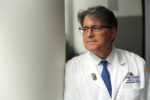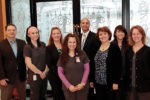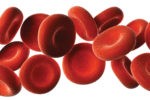Fighting Cancer’ for Sarcoma
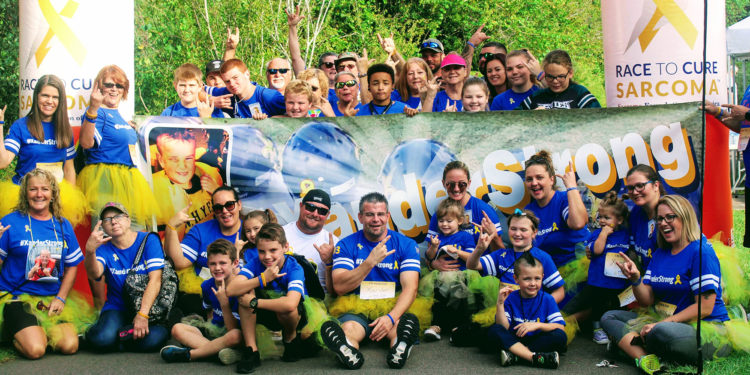
Story and Photos by Sarcoma Foundation of America
 Each July, we celebrate Sarcoma Awareness Month. But many people have never heard of sarcoma, including people newly diagnosed with the disease. Sarcoma is a type of cancer that begins in the bones and in the soft or connective tissues. Soft tissue sarcoma forms in the tissues that connect, support, and surround other body structures. This includes muscle, fat, blood vessels, nerves, tendons, and the lining of your joints. Because these tissues are found everywhere in the body, sarcomas can arise anywhere.
Each July, we celebrate Sarcoma Awareness Month. But many people have never heard of sarcoma, including people newly diagnosed with the disease. Sarcoma is a type of cancer that begins in the bones and in the soft or connective tissues. Soft tissue sarcoma forms in the tissues that connect, support, and surround other body structures. This includes muscle, fat, blood vessels, nerves, tendons, and the lining of your joints. Because these tissues are found everywhere in the body, sarcomas can arise anywhere.
It is a rare and devastating cancer that is often misdiagnosed and has no early screening options. Sarcomas account for one percent of all diagnosed adult cancers and fifteen to twenty percent of diagnosed childhood cancers. In 2022, an estimated 17,000 people in the United States will be diagnosed with sarcoma, and over 7,200 people will die from this disease, 42% of diagnosed cases.
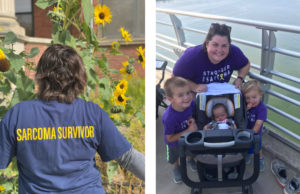 A person diagnosed with sarcoma faces many obstacles. About fifteen percent of sarcomas are found in a metastatic stage, meaning the cancer has already spread to other areas of the body. Often, patients engage with a care provider with very little experience with sarcoma, so the diagnosis may not be considered. It can take years for patients to reach a sarcoma specialist and receive an appropriate diagnosis and treatment. Approximately 50% of sarcomas are totally resistant to surgery, chemotherapy, and radiation.
A person diagnosed with sarcoma faces many obstacles. About fifteen percent of sarcomas are found in a metastatic stage, meaning the cancer has already spread to other areas of the body. Often, patients engage with a care provider with very little experience with sarcoma, so the diagnosis may not be considered. It can take years for patients to reach a sarcoma specialist and receive an appropriate diagnosis and treatment. Approximately 50% of sarcomas are totally resistant to surgery, chemotherapy, and radiation.
Another obstacle to living with sarcoma is the lack of awareness or understanding of the disease and its impact. Women, men, and children diagnosed with sarcoma have few resources for information and few resources to assist them through their cancer journey. Further, sarcoma research for finding new, novel, and better treatments is underfunded. Although investments by the federal government and pharmaceutical industry have increased, sarcoma research lags other cancers. For many of the over 100 histologic subtypes, there is very little research being done and no FDA-approved product. Thus, the extreme need for new therapeutic approaches.
The Sarcoma Foundation of America (SFA), founded twenty-two years ago, was created to fill these unmet needs – to fund and advocate for more sarcoma research, encourage the development of new and better therapies, grow awareness, and educate sarcoma patients. The spark that ignited the start of SFA was the diagnosis of then 3-year-old Jeffrey Thornton with sarcoma. His parents, Dr. Mark and Patricia Thornton, along with physician, Dr. John Brooks, were motivated to act, not only to help treat his cancer, but others’ as well. Grappling with Jeffrey’s diagnosis, they found there wasn’t a national patient advocacy and research organization dedicated to sarcoma patients and their families. They sought to fill that void.
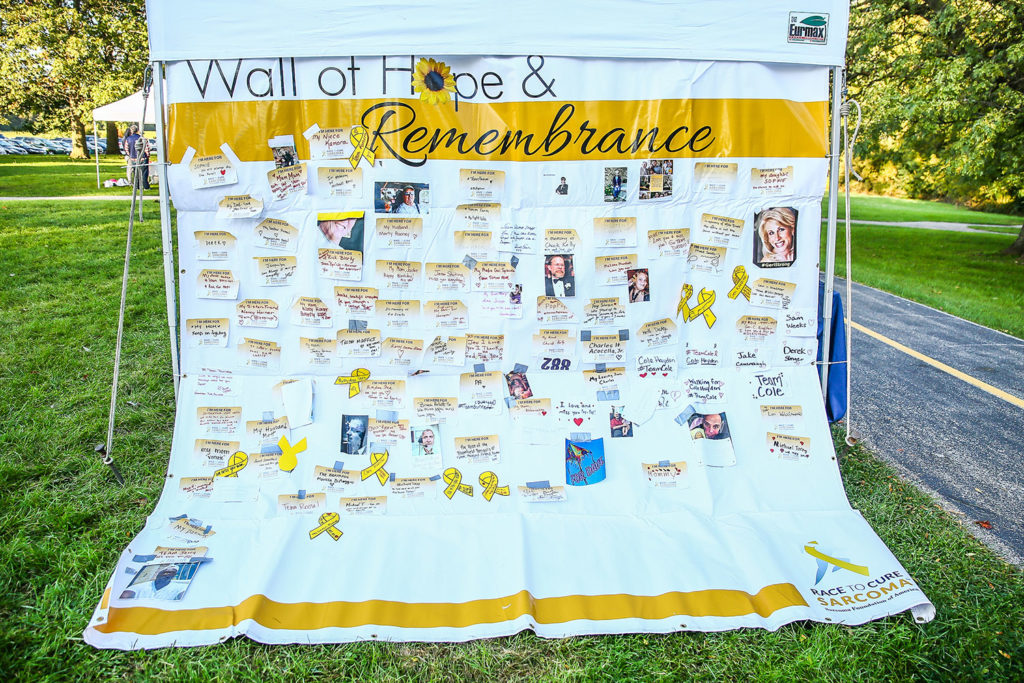
The single resolve of SFA is to find a cure for sarcoma. The organization raises money to privately fund grants for sarcoma researchers and conducts education and advocacy efforts on behalf of sarcoma patients. Through its grant program and other funding mechanisms, SFA funds the best research available that will make the biggest impact on the largest number of sarcoma patients. Over the course of the organization’s 22 years, SFA has invested over $13 million, funded over 200 research grants at 165 different institutions, and supported more than 150 researchers in more than 10 countries, making SFA the leading private funder of research in the sarcoma community.
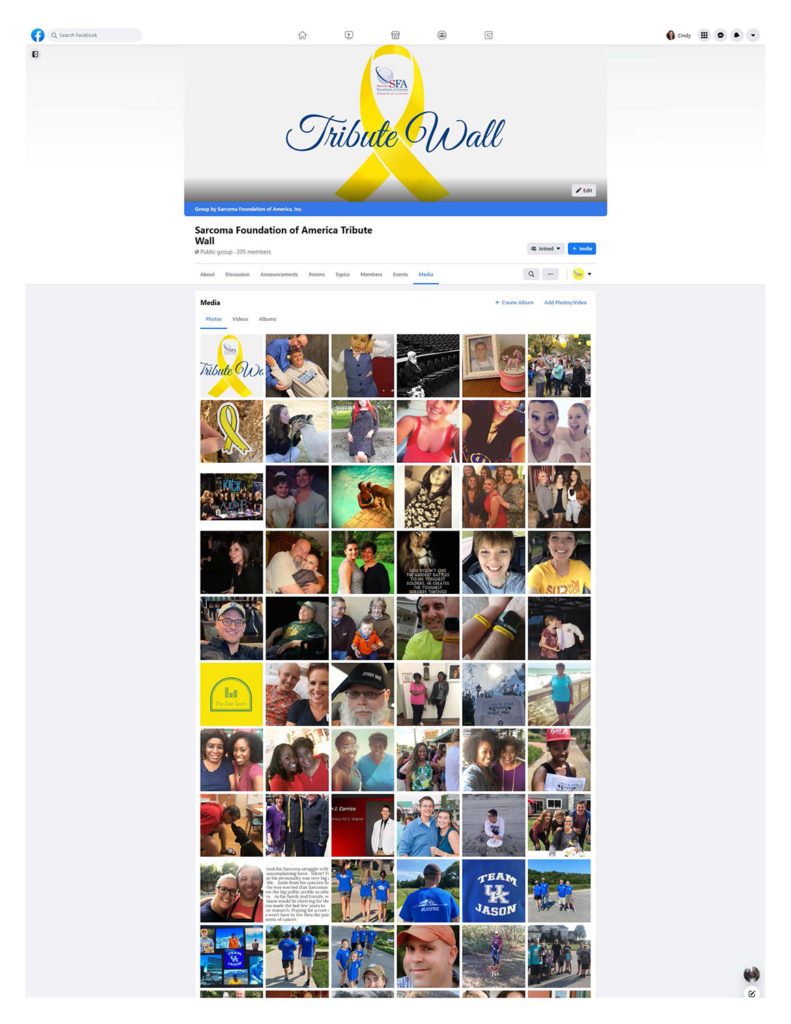
SFA serves as the voice for the sarcoma community by educating legislators, federal and state agency officials, health and research communities, and the public about the need for additional research and new therapies. SFA advocates for increased research funding for sarcoma to improve the level of awareness, interest, and investment in research for sarcoma. These advocacy efforts have resulted in focused research programs on sarcoma by the National Cancer Institute, as well as new investments by the biopharmaceutical industry. In 2021, after many years of lobbying and advocacy, the Senate designated the month of July as Sarcoma Awareness Month. This was a huge step forward in raising awareness about the disease and the needs of the sarcoma community.

SFA also organizes The Race to Cure Sarcoma® (RTCS) event series, which is made up of family-friendly runs/walks held in cities across the nation and is the premier run/walk series in the United States focused on raising awareness and research funds for sarcoma. More than $150,000 from the proceeds raised from the Race to Cure Sarcoma Kansas City event and SFA’s research program has been invested in the local community.
During Sarcoma Awareness Month, SFA organizes a campaign to galvanize the sarcoma community and increase awareness about the disease. We host education sessions, special subtype days, special awareness day social media themes, and a “wear yellow” for sarcoma day scheduled for July 17. SFA also hosts the National Virtual Race to Cure Sarcoma, inviting sarcoma patients, families, friends, caregivers, and supporters to join in the effort to advocate for more and better sarcoma treatment options by participating in the race from any location they choose. The 2022 event will take place on Saturday, July 23. Participants can walk, run, or bike, inside or outside, with family or with friends, to support sarcoma research. Even though participants may be in distant locales, this race is a chance for all to come together in spirit and honor sarcoma patients and survivors and remember the loved ones that have been lost to this devastating disease. To be a part of this national effort and register for the National Virtual Race to Cure Sarcoma, visit: https://p2p.onecause.com/nationalvirtual.
Resources for sarcoma patients and families, videos of educational webinars, registration links for all of the Race to Cure Sarcoma events, as well as information on the research that SFA has funded, can all be found on the Sarcoma Foundation of America’s website: www.curesarcoma.org.

